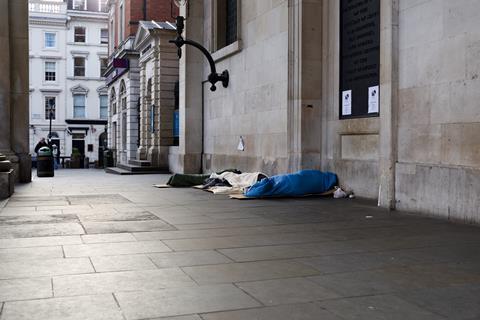Sadiq Khan to set aside additional £10m to tackle problem
Sadiq Khan has announced a pledge to end rough sleeping in London by 2030 if he is re-elected at the next election on 2 May.
In a speech this morning, Khan said his plan to eliminate rough sleeping in the capital will involve setting aside an extra £10m in investment, which he added is City Hall’s “biggest single intervention” to tackle rough sleeping on record.
The money will be used to set up an expanded network of Ending Homelessness Hubs across the city.

The hubs will provide specialist assessment and support and help an additional 1,700 rough sleepers off the streets annually by the end of the mayoral term, he said.
The new network of Ending Homelessness Hubs will build on the current No Second Night Out (NSNO) services, which were established in 2011 by the London Mayor’s Task Force and homeless charity St Mungo’s.
The NSNO service identifies new rough sleepers and helps them off the streets immediately, to try and prevent them from becoming entrenched in long-term homelessness.
The network of hubs will double from the current core provision of three, to six by the end of the term, helping an additional 1,700 people sleeping rough a year with rapid assessment and rehousing.
In his speech, Khan pledged “to end the indignity, fear and isolation felt by those forced to endure a life on the street once and for all”.
>> See also: Local elections 2024: London mayor Sadiq Khan’s record on the built environment
Khan will also strengthen joint-working with all London’s boroughs and charities helping rough sleepers and work side-by-side with the next government “to overcome the social and economic injustices which leave our society scarred and our people with no place to call home”.
He added it was time “to reject the notion that homelessness is some natural, stubborn feature of modern life that we have no option but to abide”.
According to the latest government figures, it was estimated that 3,898 individuals were sleeping rough on a single night in last autumn.
While this figure is still less than the highest recorded in autumn 2017, which saw an estimated 4,751 individuals sleeping rough in one night, it represents a 27% increase from 2022.
Furthermore, it is a 120% increase in rough sleeping compared to 2010, when 1,110 individuals were rough sleeping on a single night.
Election Focus

As thoughts turn towards the next general election, the UK is facing some serious problems.
Low growth, flatlining productivity, question marks over net zero funding and capability, skills shortages and a worsening housing crisis all amount to a daunting in-tray for the next government.
This year’s general election therefore has very high stakes for the built environment and the economy as a whole. For this reason,
Building is launching its most in-depth election coverage yet, helping the industry to understand the issues in play and helping to amplify construction’s voice so that the government hears it loud and clear.
We kick off this month with a three-parter looking at the state of play across three key topic areas.
Building is investigating the funding gaps facing the next government’s public sector building programmes, looking at the policy options available to the political parties.
In the coming months our Building Talks podcast will focus on perhaps the hottest political topic: the housing crisis. The podcast will feature interviews with top industry names who side-step soundbites in favour of in-depth discussions.
As the main parties ramp up their policy announcements, we will keep you up to date with their latest pledges on our website through our “policy tracker”.




























No comments yet